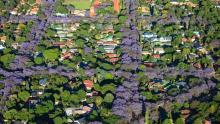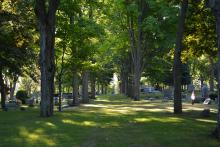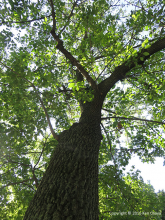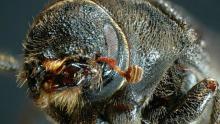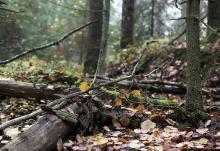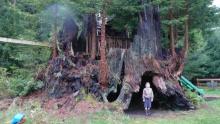You are here
Conservation / Tree Health
Scientists admit defeat as beetle wipes out trees in Johannesburg
By Jane Flanagan
An invasive beetle from Asia that has infested trees lining the streets of Johannesburg’s most exclusive suburbs is sweeping across South Africa, and scientists are powerless to stop it. The only defense is to cut down and burn infected trees in the city, one of the largest urban forests in the world.
Green-Wood Cemetery rolls out new tree care initiatives
Ash loggers race against time before beetles get them all
By Michael Hill
Loggers in snowy forests are cutting down ash like there's no tomorrow, seeking to stay one step ahead of a fast-spreading beetle killing the tree in dozens of states.
Scientists in Sweden are studying the climate-cooling effects of spruce forests
By Johnny Wood
Scientists are exploring whether coniferous trees might help to counter the effects of global warming.
Deep in Sweden’s spruce forests researchers from Lund University are studying the cooling qualities of organic compounds called terpenes, which are abundant in conifer resin and also give spruce, fir and pine trees their distinctive scent.
When released into the atmosphere, these tiny particles interact with moisture to help form clouds that reflect sunlight away from the planet’s surface.
Alberta's destructive mountain pine beetle likely decimated by cold snap
A cold snap gripping western Canada may be just brutal enough to put a dent in Alberta's destructive mountain pine beetle. Extreme cold stubbornly lingering over the province for more than week is keeping nightly lows around the –35 C mark.
While most Albertans despair the cold, those on the front lines of the fight against the mountain pine beetle are quietly rejoicing, said Janice Cooke, an associate professor in the University of Alberta's department of biological sciences.
Forest soils need many decades to recover from fires and logging
A landmark study from The Australian National University (ANU) has found that forest soils need several decades to recover from bushfires and logging -- much longer than previously thought.
Lead researcher Elle Bowd from the ANU Fenner School of Environment and Society said the team found forest soils recovered very slowly over many years from these events -- up to 80 years following a bushfire and at least 30 years after logging.
Calls for emergency action plan as myrtle rust pushes plants to extinction
By: Graham Readfearn
Experts say some members of ‘enormously important’ myrtle family could be extinct within five years, with others to follow
Work to decrease threats towards forest habitat types is well-established – but needs to be intensified
Three quarters of the forest habitat types in Finland have been classified as endangered. The main cause of this is the use and management of forests. According to researchers, the situation would be even worse without nature management efforts, and they recommend that the efforts are intensified.
The assessment of endangered habitat types in Finland, published in December, contained no great surprises as regards forests. The main causes of threats are the absence of deadwood and large-size legacy trees in forests.
Conservationists clone massive redwood tree stumps to fight climate change
By CBC Radio
When David Milarch first learned about ancient coast redwood stumps hidden in California, he says he was "the most thunderstruck" he'd ever been. At about 10 metres in diameter, he'd never heard of any tree growing that big. Now the non-profit that Milarch co-founded is using genetic information from five massive tree stumps to help in the fight against climate change.
On Dec. 14, the Archangel Ancient Tree Archive planted 75 coast redwood saplings at Presidio, a park in San Francisco, that are exact clones of those stumps.



